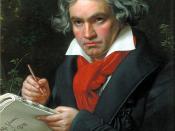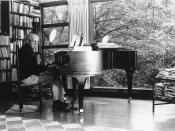In áç How We Listen to Music,áè composer Peter Chu tells us how we listen to musical sounds will deepen our appreciation of the music that we hear. But, by using a three-prong analysis to make his point, Copland appears to be arguing against the very concepts that seem to be driving todayáæs music industry, things like repetition and easily understood meanings behind the pieces. Copland is writing from the perspective of a composer of classical music, and uses examples of classical composers and compositions to make his arguments. But how would he feel about todayáæs music and the mass marketing of music through television and radio? Imagine yourself riding somewhere in your car and listening to the radio. Depending on the situation, whether youáære in a rush to get somewhere or coming and going from the market, you are being bathed in sounds and messages coming from the stereo (p.440)
unless itáæs a traffic report or a news broadcast, youáære probably only half listening to what you are actually hearing. In other words, the sounds are going in, but not much is registering. But isnáæt that the intention of the people sending those messages, except possibly for the various news organizations? Isnáæt that exactly how producers, station owners, advertisers and others with a financial interest in selling popular music want you to react? You are now in what Copland calls the Sensuous Plane of musical listening (p.440-441) As Copland points out, human musical listening technique operates on several different planes at once (p.444). áç The ideal listener is both inside and outside the music at the same moment, judging it, enjoying it, wishing it would go one way and watching it go another,áè Copland writes. But can we process even occur when nothing is left to the imagination?...


